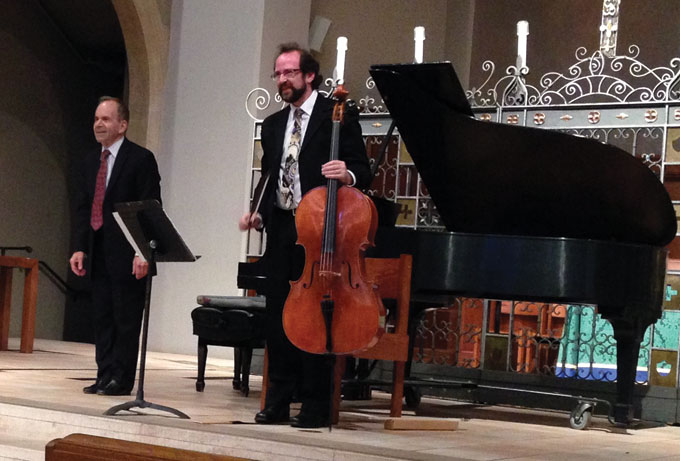The Friends of Vienna, the Camerata di Sant'Antonio and the Freudig Singers
by Jan Jezioro

A weekend of original music making
Friends of Vienna
On Sunday October 26 at 3:30pm in the Unity Church, 1243 Delaware Avenue, the Friends of Vienna welcome UB professor of cello Jonathan Golove and UB emeritus professor of piano Stephen Manes for a cross-cultural musical journey. The far-ranging program focuses on the art of the arranger, exploring works by Bartók, de Falla and Wolf while offering a world premiere of a new work by the rising young Turkish composer Esin Gündüz.
Two Partridges, a work for piano solo commissioned by the Friends of Vienna, is a set of variations based on a traditional Turkish folksong. “The lyrics of the original folk song have vivid descriptions of the lover, and the singer’s longing for her”, says Gündüz. “The mood of the folk song is contemplative and the titles of the variations, such as spirited, down-pour, and the yoga of piano reflect the changing nature of the music”.
“Bartók’s Roumanian Folk Dances are played in versions for many different instruments”, says Golove, “but the mid 20th century cellist and pedagogue Luigi Silva did some very nice things with colors that are specific to cello, or you might say, to string instruments in general. Maurice Maréchal’s version of the Suite Populaire Espagnole by de Falla is based on the transcription that had already been made for violin by the Polish violin virtuoso Paweł Kochański. The cello plays not only the vocal melody, but also takes on elements that belong to the piano part of the original songs, with gestures that will definitely make the listener think of Spain.”
“I had the idea of connecting the echoes of Spanish influence to be heard in several of the works with music from Vienna. That connection is already made, in a sense, by the inclusion of Webern’s Drei Klavierstücke, which is quoted by Mexican composer Mario Lavista in his Quotations, the program’s centerpiece. But I saw the opportunity to carry the Spanish/Viennese idea further, and so Stephan and I begin reading through songs from Hugo Wolf’s Spanish Songbook. By and large, our transcriptions simply assign the vocal line to the cello, but with a few ‘enhancements,’ such as utilizing the cello’s large range to render more vividly the dialogue between the sinner and the redeemer in “Herr, was trägt der Boden hier.” And I couldn’t resist making the wake-up call in “In dem Schatten meiner Locken” a bit more trumpet-like!
Tickets: $10, $5 students. Information: friendsofvienna.org
Camerata di Sant’Antonio
Christopher Weber, music director of the Camerata di Sant’Antonio, consistently manages to discover new ways to include neglected or forgotten classical music gems in his programs. The unifying theme of his concerts this season, “Mostly Mozarts,” finds the group exploring the music of four composers, including the very well-known Rossini and Mendelssohn, as well as the more obscure Chevalier de Saint-Georges and Bernhard Henrik Crusell, who have been at times likened to Mozart, alongside of works by that incomparable master himself.
The Camerata opens its season on Friday October 24 at 7pm at the Canisius Montante Center, a new venue for the group. Mozart’s Concertone in C major, for Two Violins, oboe, cello and Orchestra, K. 190, seems to be, rather amazingly, making its Buffalo premiere on this program. Violinists Andrea and Douglas Cone will be joined by oboist Paul Schlossman and cellist Eva Herer in the tunefully elegant work that most listeners will have only heard via recording. Perhaps no composer has more earned the right to be compared to Mozart than Mendelssohn, and Frank Scinta will lead the Canisius College Chorale in that composer’s Verlieh uns Friedsen and Buxtehude’s cantata Befiehl dem Engel, while the Camerata will offer another area premiere, that of the unjustly maligned Antonio Salieri’s Sinfonia Veneziana.
Tickets: $17. Information: 856-3626
Freudig Singers
This year marks the centenary of the outbreak of World War I, the greatest catastrophe in the history of Western Civilization. On Saturday, October 25th at 7:30pm, the Freudig Singers open their 30th anniversary season by remembering that tragic event in their program In Flanders Field: Music and Poetry of World War I, which combines choral music along with spoken poetry and drama, at the Buffalo Seminary on Bidwell Parkway.
Ron Martin, artistic director of the Freudig Singers, says “There will be three different settings of the John McCrae poem In Flanders Fields, including one that I just wrote for this program, as well as selections from the Six Choral Settings to be Sung in Time of War, in which the words of Percy Bysshe Shelley are put to music by Ralph Vaughan Williams. I managed to find a wonderful piece by Charles Villiers Stanford, exquisitely crafted for chorus, the very moving Last Post, which includes the ‘Last Post’ bugle call, the European answer to ‘Taps’, in the fabric of the piece.” The event will include an excerpt from the New Phoenix Theatre’s recent powerful production of Erich Remarque’s anti-war novel, All Quiet on the Western Front.
Suggested donation: $10. Phone: 716-472 -0009.
blog comments powered by Disqus|
Issue Navigation> Issue Index > v13n43 (Week of Thursday, October 23) > The Friends of Vienna, the Camerata di Sant'Antonio and the Freudig Singers This Week's Issue • Artvoice Daily • Artvoice TV • Events Calendar • Classifieds |









 Current Issue
Current Issue